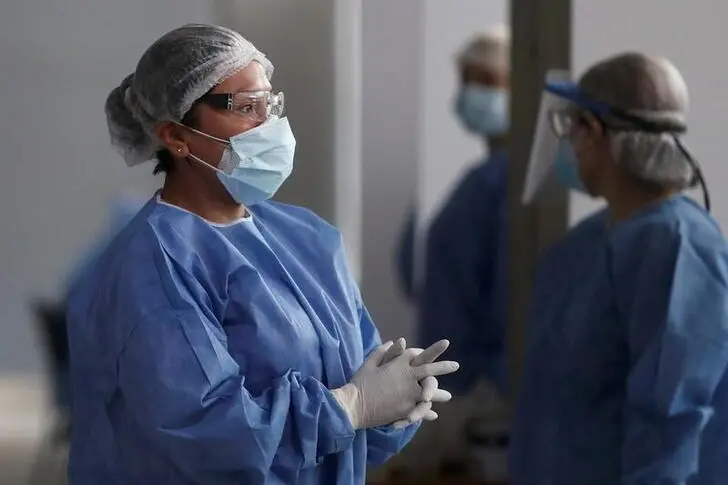PHOTO
More than a year has passed since the emergence of the coronavirus disease (COVID-19) and, with it, a pandemic that is still wreaking havoc across the globe. Biological threats are not just public health crises, they also have the power to paralyze entire nations through economic recessions, productivity downturns, international and domestic security fears, the loss of lives, and civic distress. It is thus imperative that global leaders work collectively to upgrade their health security measures to counter the effects of infectious disease outbreaks.
In recent years, epidemics have served as a wake-up call to nations. The 2003 SARS outbreak spread to two dozen countries in Asia, Europe, North America and South America before it was contained. By then, it had infected more than 8,000 people and claimed the lives of about 800. In 2014, the Ebola virus outbreak in West Africa became the biggest of its kind in history. West African countries were, at the time, ill-prepared to deal with this unfamiliar illness, with weak detection systems and healthcare workers untrained in handling such a disease; not to mention the social and economic upheavals that accompanied the outbreak. These factors enabled the disease to spread expansively across populations until global efforts brought it under control.
Spurred by such recent biological threats, many governments took measures to improve national health security in order to prevent, detect and respond to serious threats. For example, the Singaporean government in 2019 established the National Centre for Infectious Diseases to strengthen its capabilities in terms of preventing and managing infectious diseases. Its work focuses on long-term horizon scanning and risk assessments, as well as training on outbreak management, epidemiological research, and outbreak readiness and response. Elsewhere, the South Korean government invested heavily in digital health technologies to monitor infectious diseases and manage outbreaks. Its detailed epidemiological data dashboard has enabled the government to successfully curb COVID-19 infection rates by tracking patients, identifying hotspots and alerting citizens.
Health security essentially refers to a country’s ability to prevent the emergence of pandemics, detect and report biological threats, ensure early and rapid responses, manage a robust healthcare system with sufficient infrastructure and trained healthcare professionals, comply with international health standards, and measure its vulnerability to biological threats. The most comprehensive evaluation of health security capabilities is the Global Health Security Index, which assesses 195 countries in this area and is published by the Johns Hopkins Center for Health Security, the Economist Intelligence Unit, and the Nuclear Threat Initiative.
Its 2019 report revealed that no country is fully equipped to face epidemics or pandemics, with major gaps in their public health systems preventing them from doing so. For example, fewer than 7 percent of countries scored in the top tier for their ability to prevent the emergence of pandemics. Furthermore, only 20 percent scored well in monitoring, detecting and reporting emerging outbreaks, while fewer than 5 percent had the public health and governance systems to respond rapidly to outbreaks and mitigate their spread.
The rankings also highlighted the health security levels in Arab states, with Saudi Arabia leading the region in its capability, followed by the UAE and Kuwait. Unfortunately, many other Arab states’ scores categorized them among the least-prepared nations, with perilous outages that leave them ill-equipped to handle outbreaks.
It is clear that governments worldwide need to seriously commit to upgrading their health security. This can be done, firstly, by establishing a dedicated agency that is responsible for monitoring and managing infectious disease outbreaks, in addition to conducting vital epidemiological research, bringing new knowledge on medical diagnoses and treatments related to infectious diseases, training medical staff, coordinating with public bodies, engaging with communities, and formulating effective public health interventions.
Governments should ensure that healthcare systems are fully equipped with medical devices and personal protective gear, as well as having infection control practices in place. Sufficient healthcare professionals should also be available, and they should have access to specialized training on handling, preventing and treating patients with infectious diseases, especially during stressful periods like epidemics or pandemics. Furthermore, it is important to have a multifunctional and qualified team of physicians, nurses, epidemiologists, public health officials, laboratory staff, community health workers, and social workers that work together to deliver a holistic outbreak management strategy. In tandem, universal health coverage should be available for citizens and residents to mitigate the spread of infectious diseases.
More investment needs to be channeled into research within this area to study effective strategies in handling epidemics or pandemics from various perspectives, such as industry and trade, international relations, immigration, security, and social services. Governments and private sector companies should be encouraged to invest in research that revolves around vaccine development, case management and treatment plans, the invention of lifesaving medical devices, and effective medications. Additionally, it is important to invest in digital health technologies — namely live health data dashboards and epidemiological research — that can inform decision-makers on managing outbreaks.
Finally, it is imperative that countries work closely together to boost national health security and provide real-time global biosurveillance data, updated health research, technical advice, and emergency response efforts. It is also worth reaching out to the private sector and civil society in this regard, seeing as they have positively contributed to mitigating outbreaks in the past. For example, during the COVID-19 pandemic, they have donated to global health efforts, invested in technological innovations, provided essential products and services to affected communities, and enabled employees to work remotely.
By addressing these critical health security measures, countries can strengthen their capabilities so that they can better address the current COVID-19 pandemic and also prevent future outbreaks.
- Sara Al-Mulla is an Emirati civil servant with an interest in human development policy and children’s literature. She can be contacted at www.amorelicious.com.
Copyright: Arab News © 2021 All rights reserved. Provided by SyndiGate Media Inc. (Syndigate.info).





















